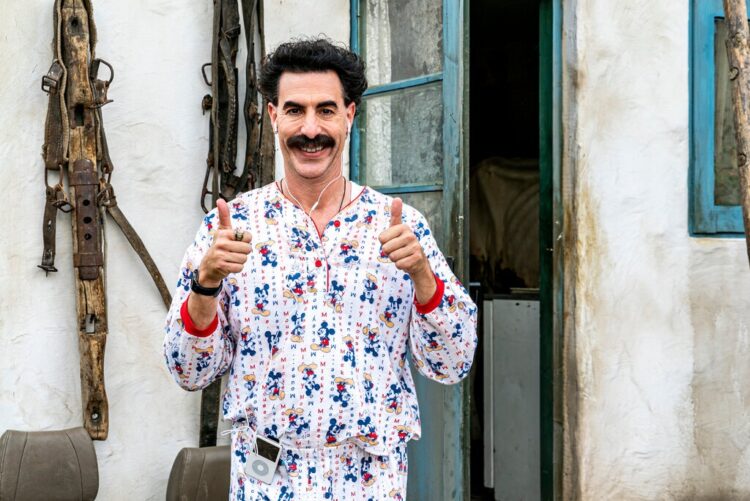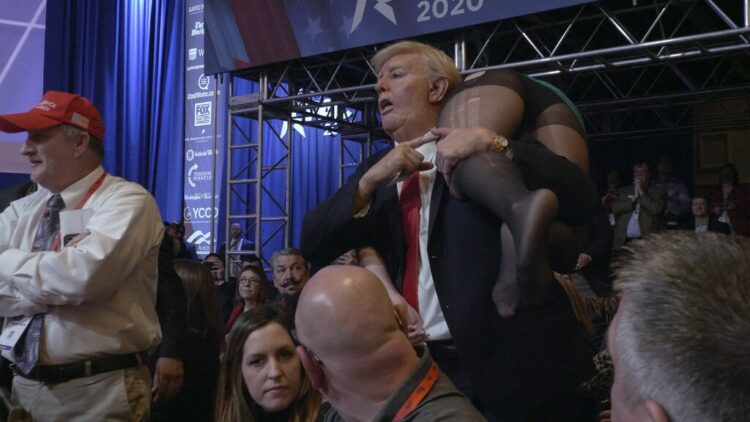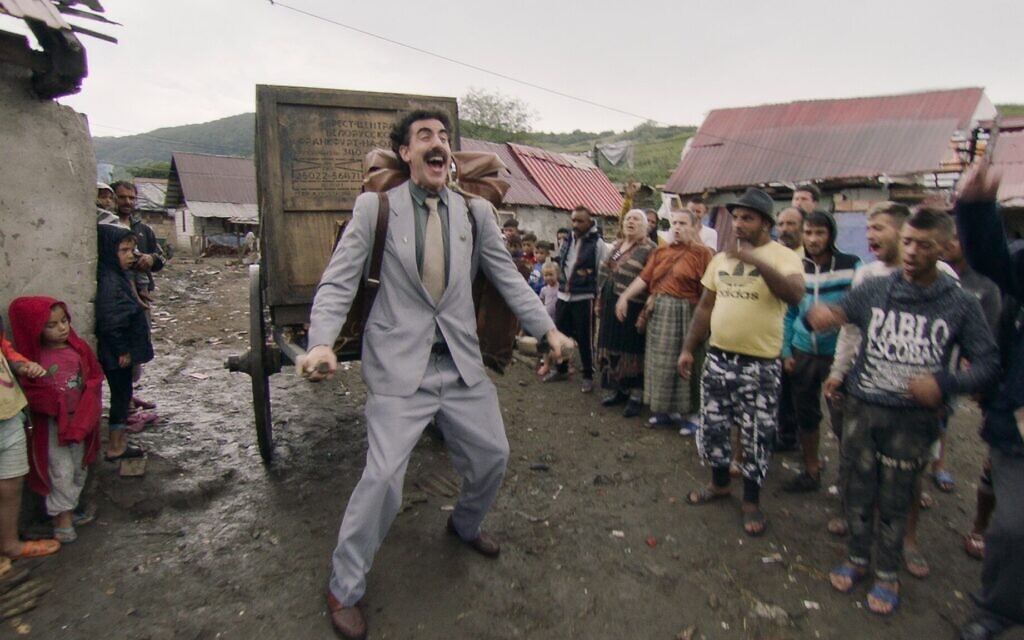I missed Sacha Baron Cohen’s first Borat film, so I have no way of comparing it to the sequel, Borat Subsequent Moviefilm, which was released late last week. Judged on its own merits, the second one is sophomoric. With the exception of a few punchy scenes, I watched it with a straight face, disappointed by its failure to deliver a knockout blow that would uplift it to comedic heights.
Cohen plays the role of Borat Sagdiyev, an antisemitic journalist from Kazakhstan who’s sent on a secret mission to Yankeeland to improve Kazakhstan’s relations with the United States. He will try to achieve this objective by offering his daughter, Tutar (Maria Bakalova), to Vice-President Mike Pence as a “sexy gift.”
Cohen and Bakalova are virtually the only professional actors in the film, directed by Jason Woliner. The cast is made up of ordinary Americans who were tricked into being filmed. Some, like Rudolf Giuliani, President Donald Trump’s personal lawyer and the former mayor of New York City, will surely regret having cooperated.

Cohen is first and last a prankster who mercilessly skewers American society as he drives around the country in search of fools and useful idiots whom he can parody. Portraying a host of different characters clad in outlandish clothes, he and his daughter talk up a storm. He converses in fluent Hebrew and she replies in her native Bulgarian. About two-thirds of the way into the film, she switches into heavily-accented English.
His modus operandi is to gleefully expose the dark underbelly of the United States. The country he encounters seethes with undercurrents of antisemitism and is awash with wild conspiracy theories. He stays clear of liberal Americans, focusing his attention on small-town Republicans who love Trump and his conservative agenda. In one of his only direct references to Trump, Cohen depicts him as a cartoon character with a permanent erection.
Oddly enough, the everyday Americans who appear in the movie are astoundingly passive and incapable of reacting to coarse and offensive language, Cohen’s usual manner of self-expression.
When he orders a chocolate cake in a bakery emblazoned with the words “Jews will not replace us,” a reference to the boorish neo-Nazi chant heard at a white supremacist rally in Charlottesville three years ago, the middle-aged woman serving him does not even squint. She carries on as usual, as if his outrageous request is perfectly normal and acceptable.
In another heartland town, Tutar performs a fertility dance during her period, shamelessly and repellingly exposing herself to a group of strait-laced young men and women at a party. And in yet another scene, Cohen, posing as Trump’s much-maligned aide Stephen Miller, wears white sheets as a Ku Klux Klan member.

Bursting into a Republican Party event, Cohen, a plastic Trump mask on his face, offers Tutar to Pence, who appears dismayed and puzzled. In short order, Cohen is escorted out of the hall.
When Tutar visits a real-life plastic surgeon, she asks a provocatively pointed question: “Do I look like a Jew?” The surgeon neither blinks not shows the slightest hint of curiosity, going about his business as if nothing unusual has occurred.

Tutar is at it again at an Empowering Conservative Women meeting during which, in child-like fashion, she describes her sensation in reaching climax. The people in the audience barely respond to her blatantly inappropriate comments.
Praising Facebook, which until very recently permitted Holocaust denial, Tutar flashes a cellphone with a disgusting message: Holocaust — a big lie. Cohen backs her up, facetiously claiming the Holocaust “never happened” and is merely a “fairy tale” and “fake.” Cohen’s demeanor softens after he meets a Holocaust survivor in a synagogue.
Having invited himself into the homes of two dishevelled strangers who resemble rednecks, Cohen learns something about America’s so-called “deplorables.” They believe that Democrats are more dangerous than the coronavirus pandemic and, in keeping with the crazy QAnon theory, think that Hillary Clinton drinks the blood of children.
Tutar’s interview with Giuliani is pathetically farcical, if not altogether stupid. After a brief question and answer session, during which he grins a lot, shares a drink with her and accuses China of deliberately having spread COVID-19 around the globe, he follows her into the hotel bedroom. He lies down on at the end of a bed, perhaps expecting sex, and places a hand in his pants, apparently to tuck in his shirt. At this juncture, Cohen rushes into the room. “She’s 15,” he says frantically. “She’s too old for you.”

So much for Giuliani. I would imagine that, in retrospect, he must be embarrassed by his appearance in this juvenile spectacle.
Cohen’s black humor is lewd, crude and forced, hardly the stuff of inspired filmmaking. It usually lacks subtlety or laugh-out-loud buffoonery.
Borat Subsequent Moviefilm sinks into the morass of mediocrity and is eminently forgettable.
